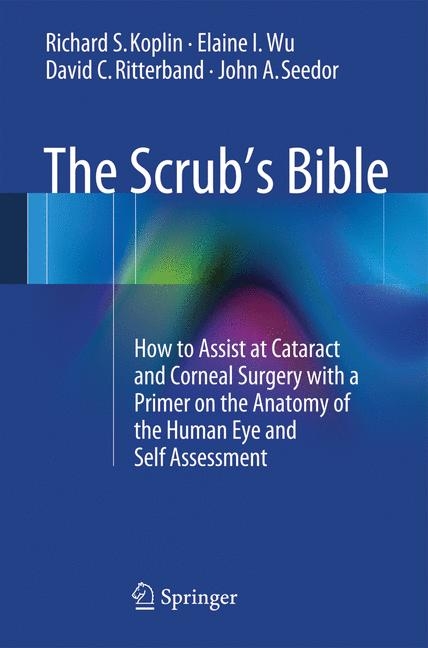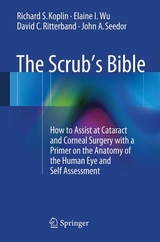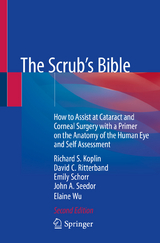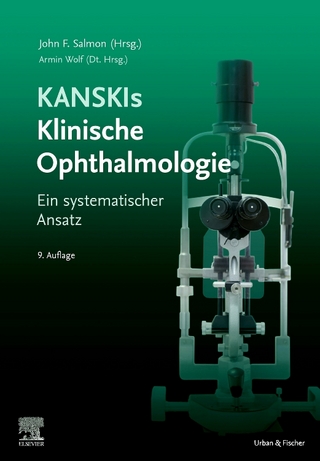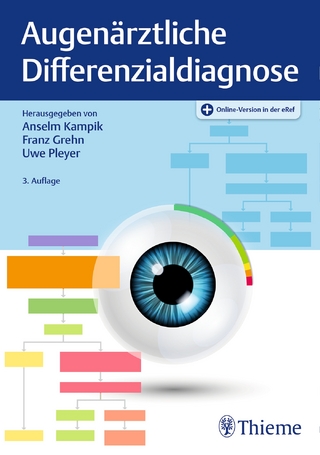The Scrub's Bible
Springer-Verlag New York Inc.
978-1-4614-5643-8 (ISBN)
- Titel erscheint in neuer Auflage
- Artikel merken
Directed at the growing number of untutored personnel aspiring to enter the disciplines of ophthalmic technicianry and surgical assisting, The Scrub's Bible represents an entry level guide to understanding the human eye, its basic anatomy, and physiology.
Directed at the growing number of untutored personnel aspiring to enter the disciplines of ophthalmic technicianry and surgical assisting, The Scrub's Bible represents an entry level guide to understanding the human eye, its basic anatomy, and physiology. Absorbing this information serves as the foundation for the authors, who are all skilled and respected eye surgeons, educators, and surgery center owners, to draw the reader through the fundamentals of the two most common areas of ophthalmic surgery: cataract and corneal/refractive surgery.
The Scrub's Bible is a comprehensive yet easy-to-read tool that is broken down into discreet and understandable elements, meant to avoid the intimidating rhetoric of a standard reference.
Richard Koplin, MD, is Senior Attending Surgeon at the New York Eye and Ear Infirmary, Surgeon at Beth Israel Medical Center, and Director of Cataract Service at the New York Eye and Ear Infirmary. He is also Adjunct Assistant Professor in the Graduate School of Social Servie Fordham University and Clinical Assistant Professor in Ophthalmology at New York Medical College. Elaine I. Wu, MD, Attending Surgeon at the New York Eye and Ear Infirmary David C. Ritterband, MD, Assistant Director, Corneal and Refractive Servies, the New York Eye and Ear Infirmary John A. Seedor, MD, Director, Corneal and Refractive Services, the New York Eye and Ear Infirmary
Chapter 1: Introduction
Key Words
Chapter 2: The Evolution of Eye Surgery
Chapter 3: The Advent of Ambulatory Eye Surgery
Chapter 4: Anatomical Considerations
Orbit, lids, and extraocular muscles
Conjunctiva, sclera, and tear film
Cornea
Anterior chamber, aqueous, and iris
Posterior chamber and crystalline lens
Vitreous
Retina, choroid, and optic nerve
Chapter 5: Infection Control
Instrument cleaning
Sterilization
Chapter 6: How the patient gets from the front door of the ASC to your OR suite
The necessary bureaucracy
Pre-operative area procedures
Chapter 7: Decorum in the OR
Chapter 8: Setting up in the OR
Scrubbing
Anesthesia
Patient prep
Draping
Instrumentation
Basic instrument table
How to hand instruments to your surgeon
Chapter 9: Contemplating Cataract Surgery
Why a patient undergoes cataract surgery
What is a cataract operation
Chapter 10: Cataract Surgery
The Operation
Entry into the eye
Intraocular anesthetic
Viscoelastic
Performing a capsulotomy
Hydrodissection and hydrodelineation
Phacoemulsification
The phaco machine
The components
Setting up the phaco machine
What you will typically find on the phaco system’s menu options
Trouble-shooting the phaco machine
Principles of phaco surgery
Phaco fragmentation techniques
Phaco machine settings
Irrigation and aspiration
Capsule polish
The lens implant and implantation
Refractive or premium IOL
Understanding IOL power selection
Insertion of a posterior chamber lens implant
Closing the wounds
Concluding the procedure
Chapter 11: Complications encountered, instruments at the ready: here is a list of “what ifs” and “what to do’s”
Chapter 12: The surgical tray for cataract surgery
Chapter 13: Surgeon specific instruments
Chapter 14: Ocular biometry
Chapter 15: Self assessment test cataract surgery
Chapter 16: Surgical checklist
Chapter 17: Corneal Surgery
The cornea; how it works
Surgery of the cornea
Patient prep and anesthesia
Contemplating corneal surgery
Chapter 18: Corneal transplantation: penetrating keratoplasty
Chapter 19: Corneal transplantation: keratoprosthesis
Chapter 20: Corneal transplantation: endothelial keratoplasty
Chapter 21: Pterygium surgery
Chapter 22: Band keratopathy removal
Chapter 23: Complications encountered, instruments at the ready: here is a list of “what ifs” and “what to do’s”
Chapter 24: The surgical tray for penetrating keratoplasty
Chapter 25: The surgical tray for endothelial keratoplasty
Chapter 26: Self assessment test corneal surgery
Chapter 27: Resource materials
Chapter 28: Medications list
Appendix A: Surgeon instrument preferences note cataract surgery
Appendix B: Patient identification wall note
Glossary of terms
| Zusatzinfo | 67 Illustrations, color; 20 Illustrations, black and white; IX, 166 p. 87 illus., 67 illus. in color. |
|---|---|
| Verlagsort | New York, NY |
| Sprache | englisch |
| Maße | 155 x 235 mm |
| Gewicht | 2759 g |
| Themenwelt | Medizin / Pharmazie ► Gesundheitswesen |
| Medizin / Pharmazie ► Medizinische Fachgebiete ► Augenheilkunde | |
| Medizin / Pharmazie ► Medizinische Fachgebiete ► Chirurgie | |
| Schlagworte | Augenchirurgie • eye surgery • Ophthalmology • surgical assistance |
| ISBN-10 | 1-4614-5643-6 / 1461456436 |
| ISBN-13 | 978-1-4614-5643-8 / 9781461456438 |
| Zustand | Neuware |
| Haben Sie eine Frage zum Produkt? |
aus dem Bereich
